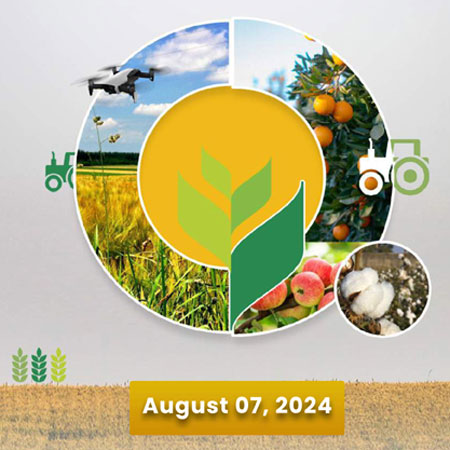
The agricultural sector in India, a vital cornerstone of the nation’s economy and livelihood for millions, faces an unprecedented challenge due to the ongoing impacts of climate change. With shifting weather patterns, increased frequency of extreme weather events such as droughts, floods, and heatwaves, and the rising unpredictability of monsoons, Indian farmers are bearing the brunt of these environmental changes. In response, the government has taken several crucial steps to mitigate these challenges and strengthen the agricultural sector’s resilience to climate variability. However, the need for continued innovation, adaptation, and policy support remains pressing.
National Action Plan on Climate Change (NAPCC) and Sustainable Agriculture
Launched in 2008, the National Action Plan on Climate Change (NAPCC) marked the government’s commitment to addressing climate change through an overarching policy framework. Within this plan, one of the key components is the National Mission for Sustainable Agriculture (NMSA), which aims to make agriculture more resilient to the evolving climate conditions. Through this mission, the government has emphasized strategies to reduce agricultural vulnerability and ensure ecological sustainability. However, despite these efforts, much remains to be done to translate these strategies into large-scale, sustainable outcomes.
A notable initiative under NAPCC, the National Innovations in Climate Resilient Agriculture (NICRA), spearheaded by the Indian Council of Agricultural Research (ICAR), is crucial in developing climate-resilient technologies for agriculture. NICRA’s extensive research and projects focus on understanding the effects of climate change on crops, livestock, horticulture, and fisheries. Its findings have already helped create a range of technologies designed to help farmers cope with extreme weather patterns. For instance, in the past decade, ICAR has released 2593 varieties, with 2177 varieties showing resilience to biotic and abiotic stresses such as droughts, floods, and heatwaves. This has been vital for regions facing severe climatic disruptions, offering farmers alternatives that better withstand erratic weather conditions.
Vulnerability Assessments and District Agriculture Contingency Plans (DACPs)
As part of a district-level risk and vulnerability assessment, over 651 predominantly agricultural districts have been mapped for their climate vulnerability, as per the Intergovernmental Panel on Climate Change (IPCC) protocols. Notably, 310 districts have been categorized as vulnerable, with 109 marked as ‘very high’ vulnerability areas. In response, District Agriculture Contingency Plans (DACPs) have been prepared to address climate anomalies by recommending specific, climate-resilient crops and management practices tailored to local conditions.
Furthermore, the government’s initiative to create Climate Resilient Villages (CRVs) under NICRA, focusing on 448 villages across 151 climatically vulnerable districts, demonstrates the importance of on-ground action in building resilience. These villages serve as hubs for disseminating location-specific technologies, providing farmers with practical tools to adapt to climate change. From adopting innovative irrigation techniques to growing drought-resistant crops, these technologies are vital for enhancing farmers’ capacity to withstand climatic shocks.
Government Schemes to Enhance Resilience
In addition to the NICRA project, several government schemes have been launched to support farmers in the face of climate change. The Per Drop More Crop (PDMC) scheme, introduced in 2015-16, promotes water-use efficiency at the farm level through micro-irrigation systems such as drip and sprinkler irrigation. This has helped farmers optimize water use, especially in water-scarce areas, ensuring more crop production with less water.
Another critical initiative is the Rainfed Area Development (RAD) scheme under NMSA, which focuses on enhancing productivity and minimizing the risks associated with climatic variability in rainfed areas. This scheme promotes Integrated Farming Systems (IFS), a holistic approach that helps diversify agricultural production and reduce dependency on a single crop, thereby minimizing risks during unfavorable weather conditions.
Moreover, the Pradhan Mantri Fasal Bima Yojana (PMFBY) and the Restructured Weather-Based Crop Insurance Scheme (RWBCIS) provide essential financial support to farmers facing crop losses due to unforeseen natural calamities. These insurance schemes are crucial for stabilizing farmers’ incomes, ensuring that they can recover from crop failures and continue farming in the face of increasing climatic uncertainty.
The Path Forward: A Need for Collective Action
While the government’s initiatives such as NICRA, PDMC, RAD, and PMFBY have laid a strong foundation for climate-resilient agriculture in India, more needs to be done to safeguard the future of Indian farmers. The challenge of climate change in agriculture is multifaceted, requiring a holistic approach that encompasses policy, technology, and farmer education. Continued investment in climate-resilient research, wider adoption of water-efficient irrigation technologies, and improved access to insurance coverage will be pivotal in strengthening the resilience of Indian agriculture. Furthermore, there is a pressing need for awareness campaigns and capacity-building programs to help farmers better understand and adapt to the changing climate.
India’s agricultural community is resilient, but climate change is an ever-growing challenge. The government’s steps to create a more climate-resilient agricultural sector are commendable, but these efforts must be sustained and scaled up to meet the unprecedented challenges ahead. Only through a combined effort of policymakers, researchers, and farmers can India ensure that its agricultural sector remains strong, sustainable, and capable of feeding the nation in the face of a rapidly changing climate.











